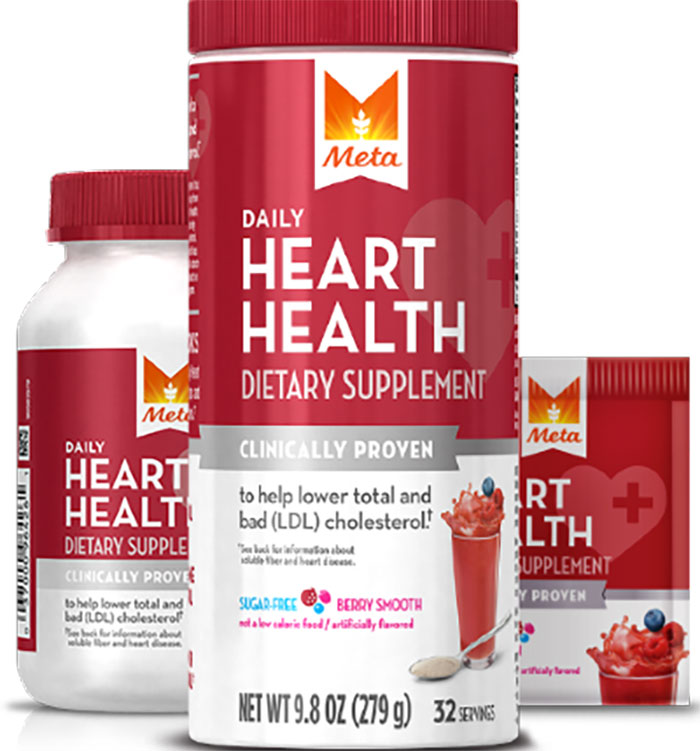UH Partners with Procter & Gamble to Promote Heart Health
August 17, 2017
Harrington Heart & Vascular Institute Innovations - Summer 2016 - View Full PDF
University Hospitals Harrington Heart & Vascular Institute has partnered with Procter & Gamble (P&G) to promote heart health to patients who might benefit from Meta Daily Heart Health, an over-the-counter supplement that can help lower total and LDL cholesterol.† P&G is launching the product in the Cleveland area beginning this month. It contains 100 percent natural psyllium husk, and is available online nationally or at selected retailers in the Cleveland and Tampa areas as a powder mix; in convenient, easy-to-dose powder packets; and in capsules.

The key dietary ingredient in Meta Daily Heart Health is psyllium husk. The psyllium husk in Meta Daily Heart Health lowers cholesterol by forming a gel and trapping and eliminating some bile via the stool. In response, the liver removes cholesterol from the bloodstream to make more bile, lowering serum total and LDL cholesterol.
Randomized, double-blind placebo-controlled clinical studies have demonstrated that psyllium is a useful adjunct to dietary intervention, lowering total cholesterol (-4 percent to -6 percent) and LDL cholesterol (-5 percent to -9 percent).1–7 Greater reductions in total cholesterol (-15 percent) and LDL cholesterol (-20 percent) have been observed with psyllium in studies with a usual, unrestricted/uncontrolled diet.8–9
For more information on Meta Daily Heart Health, visit MetaDailyHeartHealth.com.
Diets low in saturated fat and cholesterol that include 7 grams of soluble fiber per day from psyllium husk, as in Meta Daily Heart Health, may reduce the risk of heart disease by lowering cholesterol. One serving of Meta Daily Heart Health powder has 3.6 grams of this soluble fiber. One serving of Meta Daily Heart Health capsules has 1.8 grams of this soluble fiber.
References:
- Bell L, Hectorn K, Reynolds H, Hunninghake D. Cholesterol lowering effects of psyllium hydrophilic mucilloid. Adjunct therapy to a prudent diet for patients with mild to moderate hypercholesterolemia. JAMA. 1989; 261:3419–3423.
- Levin EG, Miller VT, Muesing RA, Summer DB, Balm TK, LaRosa JC: Comparison of psyllium hydrophilic mucilloid and cellulose as adjuncts to a prudent diet in the treatment of mild to moderate hypercholesterolemia. Arch Intern Med 1990; 150(9):1822–1827.
- Sprecher DL, Harris BV, Goldberg AC, Anderson EC, Bayuk LM, Russell BS, Crone DS, Quinn C, Bateman J, Kuzmak BR, Allgood LD. Efficacy of psyllium in reducing serum cholesterol levels in hypercholesterolemic patients on high- or low-fat diets. Ann Intern Med. 1993 Oct 1;119 (7 Pt 1):545–554.
- Weingand KW, Le NA, Kuzmak BR, Brown WV, Daggy BP, Miettinen, TA, Howard BV, Howard WJ. Effects of psyllium on cholesterol and low-density lipoprotein metabolism in subjects with hypercholesterolemia. Endocrinol Metab. 1997;4:141–150.
- Anderson JW, Davidson MH, Blonde L, Brown WV, Howard WJ, Ginsberg H, Allgood LD, Weingand KW. Long-term cholesterol-lowering effects of psyllium as an adjunct to diet therapy in the treatment of hypercholesterolemia. Am J Clin Nutr. 2000 Jun; 71(6):1433–1438.
- Anderson JW, Allgood LD, Lawrence A, Altringer LA, Jerdack GR, Hengehold DA, Morel JG. Cholesterol-lowering effects of psyllium intake adjunctive to diet therapy in men and women with hypercholesterolemia: meta-analysis of 8 controlled trials. Am J Clin Nutr. 2000 Feb; 1(2):472–479.
- Anderson J, Zettwoch N, Feldman T, Tietyen-Clark J, Oeltgen P, Bishop C. Cholesterol-lowering effects of psyllium hydrophilic mucilloid for hypercholesterolemic men. Arch Intern Med. 1988; 148:292–296.
- McRorie JW, Fahey GC. A review of gastrointestinal physiology and the mechanisms underlying the health benefits of dietary fiber: matching an effective fiber with specific patient needs. Clin Nurs Studies. 2013; 1:82–92.
Tags:


